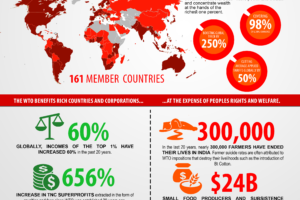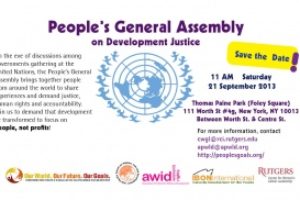The Eighth Session of the Open Working Group (OWG8), an ongoing United Nations process for defining Sustainable Development Goals (SDG), convened from February 3 to 7, 2014 in New York. The OWG, established by the UN General Assembly in January last year to prepare a proposal on SDGs that may be adopted after 2015, discussed the following concerns: (1) Oceans and seas, forests, biodiversity; (2) Promoting equality, including social equity, gender equality and women's empowerment; and (3) Conflict prevention, post-conflict peacebuilding and the promotion of durable peace, rule of law and governance.
IBON International's Paul Quintos participated in a OWG8 panel discussion on Feb. 7, where he delivered a remark on Promoting Equality for Sustainable Development. Below is the full transcript of his talk.
_______________________________________________________________________________________________________
Promoting Equality for Sustainable Development
Remarks at the OWG8
Feb. 7, 2014
By Paul Quintos
IBON International
Good morning to everyone and thank you for inviting us to join this panel and share our perspectives on the question of Equality. For us, equality is one of if not the most central issue that must be tackled by the Post-2015 development agenda.
Tackling inequality is probably the most serious challenge to SD today and more so in the future.
The grossly unequal distribution of wealth, resources and power is the principal reason for the persistence of poverty and human deprivation despite the leaps and bounds in the aggregate growth of material wealth produced in the world. Altogether, around 15 million people die every year largely due to a lack of access to nutritious food, basic healthcare services, or clean water for drinking and sanitation – equivalent to more than 40,000 preventable deaths every single day. This is not due to the lack of available resources or the limits of science and technology. It is a question of distribution and justice.
The wealthiest 20% of the world’s population consume 80% of global resources and are responsible for the vast majority of global warming and environmental destruction. The poorest 20% of the population who lack sufficient access to essentials such as food, clean water and energy account for just 1.3% of global resource consumption. The ecological footprint of high-income countries is three times that of middle-income countries, and five times that of low-income countries.
We are heartened that all of our speakers yesterday as well as delegates who spoke from the floor were unanimous in acknowledging the absolute importance of reducing inequalities between rich and impoverished, between men and women, between developed and developing countries. We are particularly supportive of the proposals from the G77 and others regarding universal social protection, progressive taxation, a focus on creating decent work for all, strengthening workers rights, ensuring equitable access, ownership and control over productive assets and natural resources, ending all forms of discrimination and ensuring equal and effective participation of all people in decision-making including and in particular that of people living in extreme poverty.
We would like to add the need to expand the commons including community-based and public or collective forms of ownership and control over the means of production and distribution. We need to progressively ensure that peoples’ access to the necessities for a dignified life is not determined by their purchasing power.
On the other hand, we would like to underscore the need to rein in the concentration and accumulation of private wealth and power, particularly corporate power. We need stricter regulatory frameworks for big business especially transnational corporations to ensure that they are fully transparent, respect human rights and are held accountable whenever they violate these rights.
A fairer international system is also urgently needed. The financial system needs to be seriously regulated through taxation of speculative flows, clamping down on tax havens, preventing tax competition, cancelling unsustainable debt burdens; and making finance serve sustainable development rather than maximizing profits. The WTO, trade agreements and investment treaties should be circumscribed by human rights norms and principles rather than the other way around.
The establishment and governance of a fairer international economic order should be coordinated by a reformed, democratic and more effective UN system. The UN can start by fully disclosing all contributions coming from the private sector and the terms and conditions of its partnerships.
We agree with the proposal to have a stand-alone global goal for reducing inequality in every country in order to raise its visibility and focus efforts in addressing it.
At the same time we should incorporate equality targets across other goals and require disaggregated data in measuring progress towards meeting these goals and targets, particularly for the lowest quintile of the population.
Thank you.


